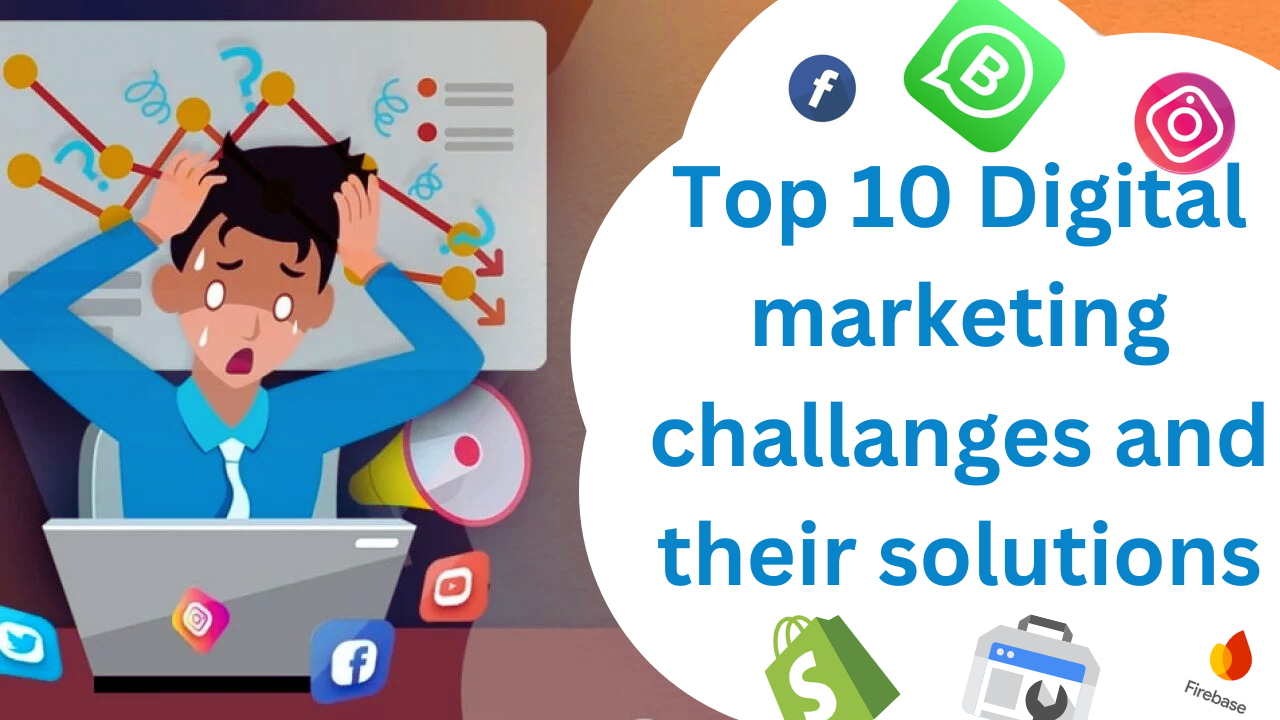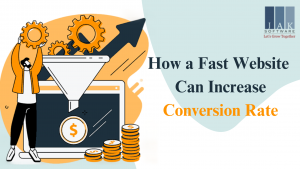Digital marketing offers incredible opportunities for businesses to connect with their target audience, build brand awareness, and grow revenues. Whether through SEO marketing, SMM services, ORM services, or PPC campaigns, the goal is to leverage the internet to stay ahead in a competitive market. However, achieving digital success is not without its challenges. Even the most well-planned marketing strategy may encounter roadblocks such as budget issues, constantly changing technologies and high competition.
Partnering with the right digital marketing agency, web agency, or top IT company can ease many of these challenges. These agencies offer specialized services, including competitive analysis and influencer marketing, to help businesses reach their goals. If you’re searching for a marketing agency near me, understanding these potential roadblocks can help you plan better and achieve digital growth more efficiently.
1. Budget Constraints
For numerous businesses, constrained financial resources are among the most significant hurdles in executing effective digital marketing strategies. marketing strategy often requires multiple elements—such as SEO marketing, SMM services, and ORM services—to work together seamlessly. However, businesses operating on tight budgets may find it difficult to afford comprehensive campaigns or premium marketing tools. Even hiring a digital marketing agency or PPC company to run targeted ads might feel like a stretch.
Impact on Digital Marketing
Budget constraints can lead businesses to underinvest in essential areas like SEO and competitive analysis, which are critical for standing out in the crowded online space. Companies may also be forced to cut corners, resulting in subpar campaigns that don’t generate desired results.
Solutions
- Prioritize Marketing Efforts: Concentrate on initiatives that will yield the greatest results, such as search engine optimization or targeted advertising campaigns.
- Use Free and Low-Cost Tools: Platforms like Google Analytics offer valuable insights at no cost.
- Scale Gradually: Begin with small campaigns and reinvest profits into larger initiatives over time.
2. Lack of Expertise
Digital marketing involves a multifaceted approach that necessitates specialized knowledge for successful implementation. Businesses without a well-trained in-house team may struggle to manage multiple platforms, run PPC campaigns, or conduct competitive analysis. Moreover, SEO marketing strategy, which involves optimizing websites for search engines, can be especially challenging for those unfamiliar with best practices. Outsourcing to a web agency or influencer marketing agency can help, but finding reliable partners isn’t always easy.
Impact on Digital Marketing
In the absence of appropriate skills, companies may squander valuable time and resources on campaigns that fail to deliver results. They may also miss out on opportunities to engage with their audience, leading to poor performance and low ROI.
Solutions:
- Invest in Employee Training: Provide access to digital marketing courses and workshops.
- Outsource Wisely: Engage specialists or agencies for targeted tasks such as pay-per-click advertising or influencer marketing.
- Foster Collaboration: Encourage knowledge sharing between departments to build internal expertise.
3. Rapidly Changing Landscape
The digital marketing environment is constantly evolving, with new trends, tools, and algorithms emerging frequently. Search engines like Google often update their algorithms, affecting how websites rank. Social media platforms frequently update their policies and advertising formats, creating challenges for businesses striving to stay current. Even experienced PPC companies or top IT companies in Delhi need to adapt continuously to remain relevant.
Impact on Digital Marketing
Businesses that fail to stay updated on trends may see their campaigns become outdated or ineffective. This can result in lost opportunities and reduced engagement from customers.
Solutions:
- Track Industry Trends: Keep informed by reading industry blogs and participating in webinars.
- Adopt an Agile Mindset: Be prepared to adjust campaigns as new trends emerge.
- Explore New Tools: Consistently trial new platforms and features to maintain a competitive edge.
4. Data Privacy Concerns
With growing concerns over data privacy, businesses need to comply with strict regulations such as GDPR (General Data Protection Regulation) and CCPA (California Consumer Privacy Act). These laws restrict how companies collect, store, and use customer data. Although essential for protecting consumers, these regulations create challenges for marketing agencies and PPC companies that rely on targeted advertising to drive conversions.
Impact on Digital Marketing
Data privacy regulations limit the amount of information businesses can collect about their audience, which can affect personalized marketing efforts. Failure to comply can lead to penalties and harm a company’s reputation.
Solutions
- Train Employees: Make sure every team member grasps the significance of adhering to data privacy regulations.
- Be Transparent: Communicate clearly with customers about how their data will be used.
- Educate Staff: Ensure that all team members comprehend the critical importance of following data privacy regulations.
5. High Competition
The digital world is highly competitive, with countless businesses vying for customer attention. From small startups to multinational corporations, everyone wants to attract the same audience. Companies without a solid competitive analysis or marketing strategy often struggle to stand out, especially if competitors are already well-established.
Impact on Digital Marketing:
High competition can increase marketing costs, such as PPC bids, and make it difficult to achieve organic search rankings. Businesses that don’t differentiate themselves may get lost in the noise.
Solutions:
- Develop a Unique Value Proposition (UVP): Communicate what makes your product or service different.
- Focus on Niche Marketing: Target specific audiences to minimize competition.
- Use Social Proof: Highlight customer testimonials and case studies to build trust.
6. Integration Challenges
Many businesses use multiple marketing tools, platforms, and strategies, which can be difficult to coordinate. Without proper integration, efforts across SEO, social media marketing, and paid advertising may become disjointed. This lack of alignment can confuse customers and reduce campaign effectiveness.
Impact on Digital Marketing
When marketing channels are not integrated, businesses miss out on opportunities to reinforce their message across platforms. Inconsistent communication also weakens brand identity.
Solutions
- Harmonize Marketing Objectives: Guarantee that all campaigns are in sync with the broader business goals.
- Use Cross-Channel Marketing: Maintain consistent messaging across platforms.
- Conduct Regular Reviews: Evaluate marketing efforts and make necessary adjustments.
7. Measuring ROI
Measuring return on investment (ROI) is crucial for evaluating the success of marketing campaigns. However, measuring the ROI of SEO marketing, SMM services, or influencer marketing can be challenging due to multiple variables. Many businesses find it challenging to determine which activities drive their success the most.
Impact on Digital Marketing
In the absence of clear performance metrics, businesses risk misallocating resources to ineffective campaigns and may find it difficult to justify their marketing budgets.
Solutions
- Set Clear KPIs: Define measurable goals for each campaign.
- Harness Analytics Tools: Take advantage of platforms like Google Analytics to evaluate and track performance effectively.
- Run A/B Tests: Experiment with different strategies to find the most effective approach.
8. Audience Targeting Issues
One of the biggest challenges businesses face is targeting the right audience. Even the most well-designed campaign can fall flat if it doesn’t reach the appropriate people. Businesses often struggle to identify their ideal customers or use outdated targeting methods that don’t align with current consumer behaviors. With so many platforms available—social media, search engines, email, and more—reaching the right audience with the right message can feel like shooting in the dark. A lack of precise audience segmentation can result in wasted marketing budgets, low engagement rates, and missed sales opportunities.
Impact on Digital Marketing
Poor audience targeting means businesses waste resources promoting products or services to people who have no interest in them. This leads to lower click-through rates, higher bounce rates, and reduced conversions. Additionally, companies may struggle with increased costs on platforms like Google Ads or Facebook Ads because they are targeting a broad audience instead of focusing on high-intent users.
Solutions
- Conduct Market Research: Use surveys, focus groups, or customer feedback to understand the interests and behaviors of your target audience.
- Craft Buyer Personas: Develop comprehensive profiles of your target customers using demographic, psychographic, and behavioral information.
- Leverage Advanced Targeting Tools: Use features like lookalike audiences on social media or intent-based keywords on search engines to narrow down your target audience.
- Monitor Campaign Performance: Continuously analyze campaign data to refine targeting strategies and ensure you are reaching the right audience at the right time.
9. Content Creation Demands
Content is at the heart of digital marketing. Whether it’s blog posts, videos, infographics, or social media updates, creating fresh and engaging content is essential to attract and retain audiences. However, the constant demand for new content can overwhelm businesses, especially those with limited teams or budgets. Maintaining a consistent content schedule is challenging, and businesses may struggle to find new ideas or formats that resonate with their audience. Additionally, each platform (like Instagram, LinkedIn, and YouTube) requires different types of content, further increasing the workload.
Impact on Digital Marketing
When content creation falls behind, it can negatively impact a brand’s online presence and engagement. Inconsistent content delivery erodes customer trust and reduces visibility on platforms that favor regular posting. A lack of engaging content also makes it harder to build meaningful connections with audiences, impacting brand loyalty and conversions.
Solutions
- Plan with a Content Calendar: Organize content in advance to ensure a consistent posting schedule and reduce last-minute pressure.
- Repurpose Existing Content: Transform blogs into videos, infographics, or podcasts to maximize their reach across multiple platforms.
- Encourage User-Generated Content: Motivate customers to share their experiences and create content for you, such as reviews or social media posts.
- Collaborate with Influencers: Partner with an influencer marketing agency to generate fresh content and reach new audiences.
10. Technology Overload
The digital marketing landscape offers a plethora of tools and platforms to manage campaigns, analyze data, and automate tasks. However, having too many tools at your disposal can lead to “technology overload.” Businesses may feel overwhelmed by the sheer number of options and struggle to choose the right tools that align with their marketing needs. Using multiple disconnected tools can also create inefficiencies and complicate workflows, especially if the tools don’t integrate well with each other. In some cases, businesses may invest in expensive software that remains underutilized due to a lack of training or resources.
Impact on Digital Marketing
Technology overload can slow down decision-making processes and reduce productivity. Marketers may waste time managing multiple platforms instead of focusing on strategy and creative work. Moreover, poorly integrated tools can lead to inconsistent data, making it difficult to measure campaign performance accurately. As a result, businesses may find it hard to optimize their marketing strategy or deliver a seamless customer experience.
Solutions
- Start with the Essentials: Focus on the most important tools that align with your business goals, such as analytics software and SEO platforms.
- Prioritize Tool Integration: Use tools that integrate smoothly with each other to avoid data silos and streamline workflows.
- Evaluate Tool Usage Regularly: Periodically review your technology stack to identify unused or redundant tools.
- Provide Team Training: Ensure your team understands how to use the selected tools effectively to maximize their potential.
Conclusion
Although digital marketing offers substantial opportunities, it also poses a range of challenges. From budget limitations to evolving trends and competitive pressures, businesses must stay adaptable to succeed. Services like SEO marketing strategy, SMM, ORM, and PPC are essential to any marketing strategy, but they require expertise and careful planning to deliver results. By partnering with a digital marketing agency or marketing agency near me, companies can overcome these obstacles and achieve sustainable growth.




